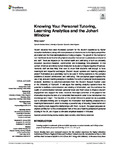Knowing You: Personal Tutoring, Learning Analytics and the Johari Window
| dc.contributor.author | Lowes, Ricky | |
| dc.date.accessioned | 2021-10-19T13:01:39Z | |
| dc.date.available | 2021-10-19T13:01:39Z | |
| dc.date.issued | 2020-07-21 | |
| dc.identifier.issn | 2504-284X | |
| dc.identifier.issn | 2504-284X | |
| dc.identifier.uri | http://hdl.handle.net/10026.1/18122 | |
| dc.description.abstract |
Recent decades have seen increased concern for the student experience by higher education institutions, along with more pressure on students due to the highly competitive job market and the financial implications of doing a degree. The growth in the number of non-traditional students attending higher education has added to pressures on students and staff. There are impacts on the mental health and well-being of both as university education becomes massified, commodified and increasingly time-pressured. In this context, informed and kindly human interaction is crucial to mitigate negative influences. However, staff are less likely than ever to know their students well enough to have meaningful and impactful exchanges. Student record systems and learning analytics present themselves as a promising tool to be used in finding solutions to the complex problems of student achievement and well-being. This conceptual paper explores the use of big data and learning analytics to facilitate the work of personal tutors (academic advisors), illustrated by practical examples from the Student Support System used at the University of Plymouth. It will argue that learning analytics systems have the potential to facilitate communication and sharing of information, and thus enhance the quality of communication between personal tutors and their tutees to improve student engagement and support the tutee. However, the major contention of the paper is that information requires the lens of a humanistic framework in order to be transformed into knowledge and insight. The heuristic of the Johari Window is presented as a possible tool to stimulate thinking and to integrate the information from learning analytics into a meaningful framework in order to develop a powerful way of knowing tutees better and thus creating more supportive relationships with them. As such, the paper proposes an original contribution to the underexplored field of the use of learning analytics in personal tutoring in the UK, and hopes to stimulate empirical research in this area. | |
| dc.format.extent | 101- | |
| dc.language.iso | en | |
| dc.publisher | Frontiers Media | |
| dc.subject | 4 Quality Education | |
| dc.title | Knowing You: Personal Tutoring, Learning Analytics and the Johari Window | |
| dc.type | journal-article | |
| plymouth.volume | 5 | |
| plymouth.publication-status | Published online | |
| plymouth.journal | Frontiers in Education | |
| dc.identifier.doi | 10.3389/feduc.2020.00101 | |
| plymouth.organisational-group | /Plymouth | |
| plymouth.organisational-group | /Plymouth/Faculty of Arts, Humanities and Business | |
| dcterms.dateAccepted | 2020-06-03 | |
| dc.rights.embargodate | 2021-10-21 | |
| dc.identifier.eissn | 2504-284X | |
| dc.rights.embargoperiod | Not known | |
| rioxxterms.versionofrecord | 10.3389/feduc.2020.00101 | |
| rioxxterms.licenseref.uri | http://www.rioxx.net/licenses/all-rights-reserved | |
| rioxxterms.licenseref.startdate | 2020-07-21 | |
| rioxxterms.type | Journal Article/Review |


